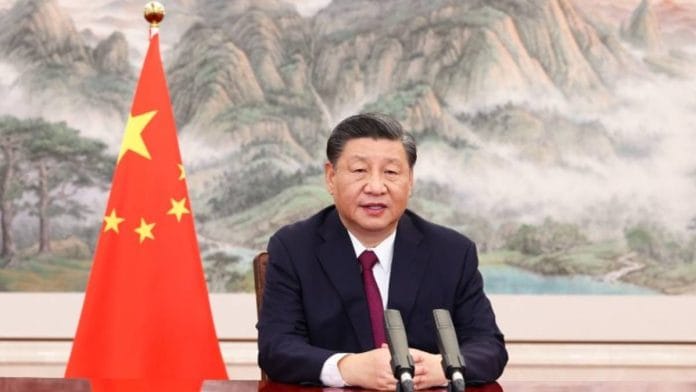New Delhi: Schoolchildren in China will now study “Xi Jinping Thought” — the president’s ideological doctrine — as well as more material about the Communist Revolution, traditional culture and security, apart from the country’s wars with Vietnam and India.
The start of the new school year this autumn will see revised textbooks for three compulsory subjects, namely history, the Chinese language, and morality and law.
According to the South China Morning Post, morality and law was taught as ideology and politics till 2016, and in this subject, students will now learn about the contents and historical status of the doctrine created during President Xi Jinping’s rule.
‘Xi Jinping’s Thought on Socialism with Chinese Characteristics for a New Era’, commonly abbreviated as ‘Xi Jinping Thought’, has also found a place in the constitution of the Communist Party of China. Commentators have characterised this as an attempt by Xi to personalise official thought to elevate himself to the stature of Mao Zedong and Deng Xiaoping.
In 2018, China removed the two-term limit on the presidency, effectively allowing Xi to remain in power for life. He was reelected for a third term in 2023, as the Chinese Communist Party extended its monopoly on power since 1949. He was re-elected as chief of the Communist Party in 2022 for a third term.
Chinese education will now focus more on national security and “forging a sense of community for the nation”, highlighting wars as “self-defence counterattacks” the army undertook during the conflicts with India and Vietnam in 1962 and 1979 respectively.
The month-long Sino-Indian war in 1962 was fought across the McMahon Line due to China’s claims over Aksai Chin in the Ladakh region of the then state of Jammu and Kashmir.
The Sino-Vietnamese War took place in 1978-79. It fails to find a mention on the Chinese foreign ministry’s website, which only says that relations went downhill between the two countries in the 1980s and 1990s.
The war was fought as concerns rose over Vietnam’s involvement in Cambodia, a Chinese ally at that time. The US, too, had called for a “withdrawal of China from Vietnam, and Vietnam from Cambodia”.
China, which projects itself as both peace-loving and invincible in war-related literature, still has border disputes with both India and Vietnam.
According to reports by the state media, the language textbooks will now include stories from the revolutionary years and the civil war preceding the establishment of the People’s Republic of China in 1949 and some ancient literature.
History textbooks will also include more information on China’s civilisational history, including material on archeological sites such as the Liangzhu Ancient City, the Taosi and the Niuheliang sites. Textbooks will also highlight stories of heroes — war heroes, astronauts, scientists, and frontline workers, among others.
The new textbooks will be introduced next week for classes 1 to 7, and by 2026 will be taught to all nine grades in primary classes and junior high.
The textbook revision, according to state reports, was undertaken by the Ministry of Education (MOE) in 2022 with over 100,000 students participating in trials for the new content. The country has about 1,43,500 primary schools and 52,300 junior high schools according to official data.
(Edited by Tikli Basu)
Also read:






